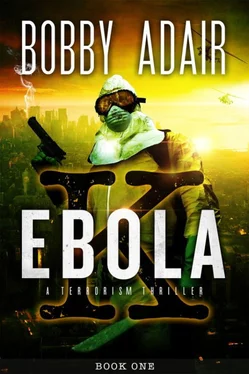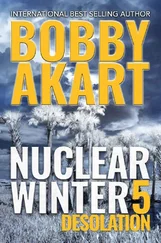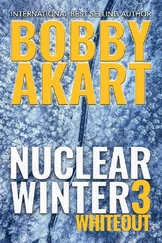“We have volunteers out now, checking.”
“Do you think there could be a lot?” Austin asked, shaking his head without meaning to. The hopelessness of the absent, red eyes in the ward was infecting him.
Mary-Margaret said, “There might be more sick people in their homes than here. This isn’t Denver. People here don’t trust hospitals like they do in the states.”
“Jesus.” Austin paused and tried to tamp down the frustration coming out in his tone. “Is everybody in the village going to get it? How many people live in Kapchorwa?”
“Maybe eleven or twelve hundred within a mile of the center of town,” she replied.
“So between the hospital, the school, and any who are in their houses and afraid to come out, how many do you think are infected? Half? More?” Austin didn’t want to believe it.
Large numbers of dying people spread across a desert refugee camp was an easy thing to depersonalize when seen from the perspective of a couch in an air-conditioned room on the other side of the world. Dying people who could be smelled, who could be touched, whose tears flowed out of empty eyes—close enough to wipe away with your own hand—that kind of dying was real in a way that few people have the misfortune to understand. And all around, people were dying—the ones Austin could see and many more that he couldn’t.
He asked, “How is it possible that so many could contract it so fast?”
“We don’t know.” Mary-Margaret shook her head. She looked defeated. “That’s why Dr. Littlefield thought at first it might be typhoid.”
Austin looked down at the bucket to make his point. “But now we know that’s not true.”
Nodding on autopilot, Mary-Margaret softly confirmed, “We know that’s not true.”
Austin squatted to stretch his legs—in a way—to get closer to the ground, so when he passed out and fell over it would hurt less. “So, somewhere between sixty and ninety percent of all of those people are going to die?”
“Depending on which strain of Ebola this is.”
Austin thought about all the people he’d seen on the streets, everyone he’d talked to, and those he’d befriended since coming to Kapchorwa—most of them were going to die. And not just die, but gruesomely waste away as their bodies painfully disintegrated from within. He looked at his gloved hands as though he might see something there—evidence that he was alive, or evidence that he might stay that way. “I don’t know.”
Mary-Margaret turned to Austin, confused. “What? What don’t you know?”
“I think I’m numb.” Austin shook his head slowly as he spoke. “I never expected anything like this . I feel like I just need to keep moving, you know. I’m afraid to stop.”
He thought about when he’d been sitting on the plane at Denver International Airport prior to take off. He’d been excited about coming to Africa. It was the grandest adventure he could imagine. But it wasn’t just that. He felt a passion to make a difference in the world. He didn’t harbor any illusions about making it better for everyone. Those kinds of thoughts were idealistic silliness. Austin’s aspirations were much simpler. He wanted to make the world better for someone , or maybe several people. So when he stood in front of his class of a dozen kids in the free school and felt the enthusiasm they had for learning, he knew he was helping them—if only just a little—toward a better life. In some ways, those days were among the best of his life. He was happy. He was making a difference.
But just as life in America has a way of killing the soul with vapid pleasures, life in Africa broke the heart through random brutality. Austin closed his eyes and choked back a tear as he saw a parade of smiling faces of those who lived in the village. Many of those people were in the clinic, and he had been carrying out buckets of their fluids all day. Their eyes were desperate with pain. They knew they were dying. Few of them had any hope.
Ebola was that kind of killer. Through its deadly reputation, it killed hope first. Without hope, victims only wanted the suffering to end. They gave up. And in lingering moments of consciousness, they stared at the ceiling or the dying person in the cot next to them. Some cried. But most were past tears.
Austin couldn’t think about it anymore. He needed to get moving. No matter how much he hurt, the work helped. “I’m running out of bleach to clean these.”
“We’re running out of everything.” And that was the end of Mary-Margaret’s hope. She put her face in her hands to catch her flowing tears.
Staring at her didn’t seem awkward. In weeks past he’d have turned away, distracted himself with a misplaced comment on something unrelated, random, and maybe even funny. But that’s what people he knew back at school did. Back in that sterile, painless world, emotions were hidden—something for keeping behind bedroom doors or in darkened rooms. Emotions were shameful things that were only put on display in books and movies, when fictional characters with imaginary problems had the right to cry, making moviegoers feel their pain so thoroughly that they cried, too.
But painful in America? How bad was that really? Losing a boyfriend? Getting a parking ticket? Missing out on a job? A long line at Starbucks? Getting behind on a credit card payment?
Pain in Africa was getting thrown off of a roof for the sin of being an orphan. It was being castrated in the street and left to bleed out. It was standing in a ward, stinking of death, watching every familiar face lose its smile, lose its hope, bleed its tears, convulse, and die.
Dr. Littlefield walked across the deserted dirt street, still groggy from his insufficient nap. Wind from a coming thunderstorm kicked up a red dust that blew down the road. Littlefield shielded his eyes as he noticed a truck parked near the hospital entrance. Had help finally arrived?
He mounted the steps and just as he landed a foot on the porch, a tall man in full protective gear opened the door and came out of the hospital. “Dr. Littlefield?” He had a thick Italian accent.
“Yes.” Littlefield glanced down at his own inadequate bundle of protective gear—a surgical mask, goggles, gloves, rubber boots, and a plastic apron.
“I’m Dr. Dante Giovanni. I sent the girl to wake you.”
“Thank you for coming, Doctor.”
“You’re an imbecile.” Dr. Giovanni sounded like a father who’d lost all his patience with a child who didn’t want to learn. “You are going to kill everyone in this town.”
Dr. Littlefield’s immediate impulse was to lash back, but he didn’t have the energy for it. Too many twenty-hour days had worn all the fight out of him.
“I’ve only been here a half hour, and I can already see this is Ebola—or maybe Marburg—if you’re lucky. And what have you done? Your nurses wear plastic aprons they’ve been reusing for days. They clean the aprons in a common bucket instead of burning them. They are not protected from this outbreak. You’re going to kill them and yourself. You don’t have a containment area. You let people walk out of the hospital and into the street, carrying the virus with them. You’ve made this whole town a hot zone. How can you be a doctor in this country and not have the good sense to take the proper steps to contain this?”
Dr. Giovanni was on the edge of the porch by then, Littlefield having backed down a few steps in the face of the scolding.
But Giovanni’s rebuke found a quick end. “Have you nothing to say for yourself?”
“Yes. Are you ready to listen?” Littlefield replied.
“Of course.” It sounded like a platitude.
“I’ll skip right over the part where I tell you I’ve been on the radio, and you’re the first person to show up.” Littlefield retreated down the last few steps and put himself on level ground. The Italian could come down and talk to him face-to-face.
Читать дальше












